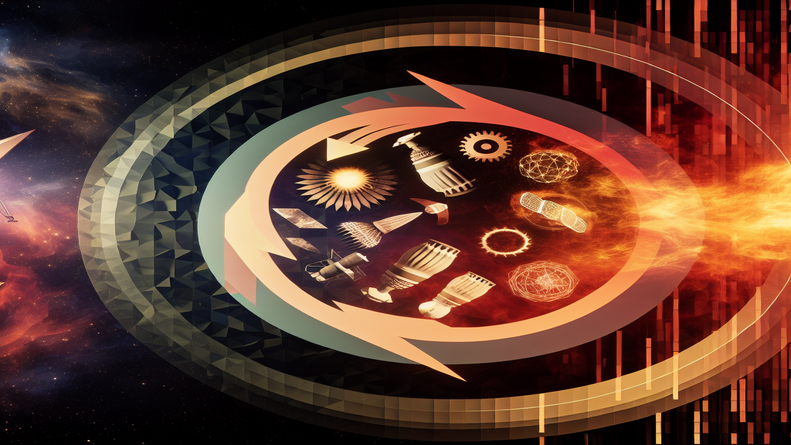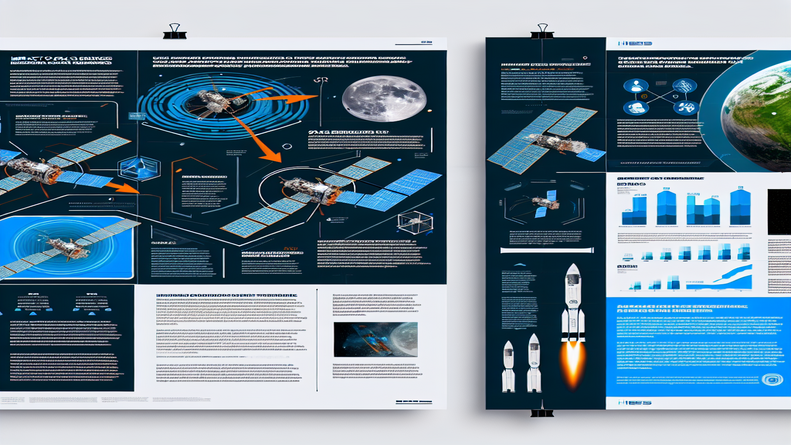![]()
In the vast expanse that is our universe, our stratosphere serves not just as a shield but as the gateway to the cosmos. As humanity ventures further into this frontier, the space economy burgeons, bringing about a burgeoning concern: the environmental footprint left by rockets and satellites. The story is not simply about reaching for the stars but also preserving the pathway there.
Emission Genesis: Understanding the Impact of Space Debris
The space industry’s growth spurs a mixture of wonder and worry. On one hand, it signifies progress, the literal height of human innovation. On the other, every launch leaves a carbon footprint, a smog of emissions, and a trail of debris in its wake. Small as they are against the cosmic canvas, these fragments of human endeavor accumulate over time, creating bands of artificial meteoroids encircling our planet. The challenge now lies in balancing our celestial ambitions with the custodianship of our stratospheric home.
Analyzing the Ascent: The Climbing Costs of Satellite Surges
As satellite constellations multiply exponentially to satiate our data-driven demands, we are forced to confront an inconvenient truth—the stratosphere suffers silently. With each ascent, space vessels break the sound barrier and pierce the atmospheric layers, dispersing chemicals and particulates that may linger far longer than their terrestrial counterparts. The price for our interconnected virtual network may well be a congested celestial neighborhood.
Technological Tact: The Pioneering Path to Sustainable Spacefaring
 In response to these concerns, a new era of engineering ingenuity is emerging. The space sector, in recognition of its role, has begun charting a more sustainable trajectory. Propulsion systems that minimize exhaust emissions, designs that prolong satellite life, and schemes that ensure safe disposal of space apparatuses all enter the innovation fold. Reusability becomes the mantra, and end-of-life de-orbiting plans become non-negotiable terms in acceptable space activity.
In response to these concerns, a new era of engineering ingenuity is emerging. The space sector, in recognition of its role, has begun charting a more sustainable trajectory. Propulsion systems that minimize exhaust emissions, designs that prolong satellite life, and schemes that ensure safe disposal of space apparatuses all enter the innovation fold. Reusability becomes the mantra, and end-of-life de-orbiting plans become non-negotiable terms in acceptable space activity.
Scrutinizing Systems: Regulatory Imperatives in Space Expeditions
With great power comes great responsibility, and the space industry is no exception. As spacefaring nations and companies push the envelope, the demand for robust regulatory frameworks accelerates. These frameworks must enforce accountability and mandate sustainable practices such as post-mission disposal protocols. International cooperation is vital, for space knows no borders, and the repercussions of negligence will be felt globally.
Global Guardianship: Fostering International Involvement
Space, by its nature, eludes single-entity control. Therefore, governance in this domain demands a multilateral approach, transcending geopolitical differences in favor of a universally beneficial goal. It is an opportunity for humanity to unite under the banner of stellar sustainability, pooling resources, ideas, and vigilance against the infringement of space’s sanctity.
Conclusion: A Commitment to Cosmic Custodianship
As explorers of the ethereal expanse, we carry an inherent obligation to safeguard the stratospheric thoroughfare that sustains our journeys. The burgeoning space economy, with all its boundless potential, brings forth challenges that we must meet with ingenuity and responsibility. By pioneering sustainable space practices, establishing comprehensive regulations, enabling international collaborations, innovating with active debris removal technologies, and fostering environmental education, we can secure a future where our stellar aspirations harmonize with stratospheric stewardship.Are you ready to join the movement and redefine the scope of what’s possible within your organization? Connect with me on [Laurent Rochetta’s LinkedIn page](https://www.linkedin.com/in/laurentrochetta/) to explore how you can harness the power of innovative thinking and embark on a journey of sustainable space endeavors. 🚀🌟
